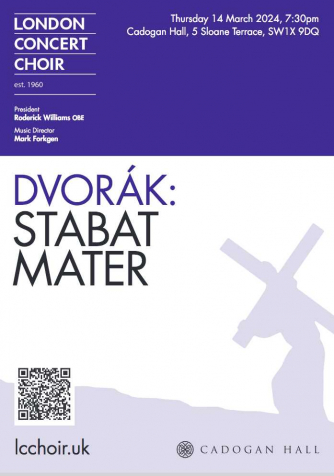Details
Cadogan Hall
5 Sloane Terrace
Sloane Square, Belgravia
London
SW1X 9DQ
England
Programme
Antonin Dvorak – Stabat Mater, Op.58
Performers
Mark Forkgen – Conductor
Philippa Boyle – soprano
Hannah Pedley – mezzo-soprano
Alexander James Edwards – tenor
Paul Carey-Jones – bass-baritone
London Concert Choir
Counterpoint
Programme Note
The Stabat Mater by the Czech composer Antonín Dvorák is an extensive sacred oratorio for soloists, choir and orchestra to the text of a medieval devotional poem depicting the suffering of the Virgin Mary at the foot of the Cross. It is also a timeless, universally valid testimony of human sorrow and hope.
Dvorák began writing the piece in 1876 and completed it in 1877. His original inspiration was the death of his infant daughter Josefa, but it was finished only after two more of his young children had died. There are ten movements, of which only the first and the last are thematically linked. The work is deeply influenced by Czech folk music and imbued with the composer’s sincere religious faith. Like all Dvorák’s large-scale religious compositions, it was intended for concert performance.
The oratorio was first performed in Prague in 1880. The London premiere in 1883 was such a success that the following year the composer himself was invited to conduct a performance in the Royal Albert Hall with a large orchestra and a chorus of more than 800 voices. This event played a crucial role in Dvorák’s international breakthrough as a composer and the Stabat Mater continues to be his best known and most often
performed sacred work.
Appearing with Mark Forkgen at all the major London concert venues, London Concert Choir is notable for its unusually varied repertoire and the commitment and musicality of its performances.

 Your events at Classical Events
Your events at Classical Events

